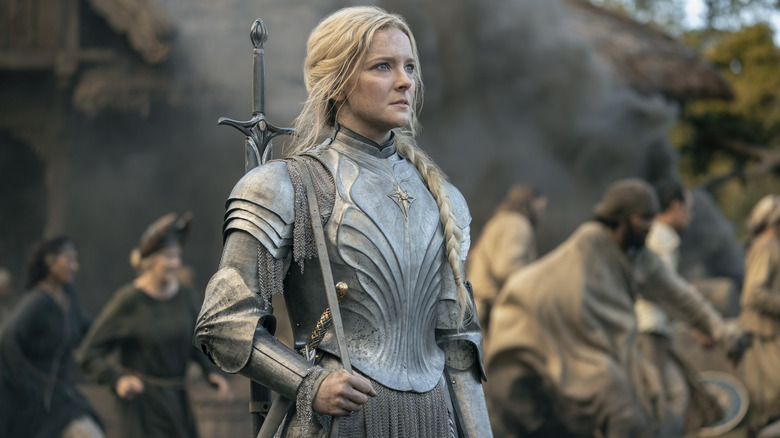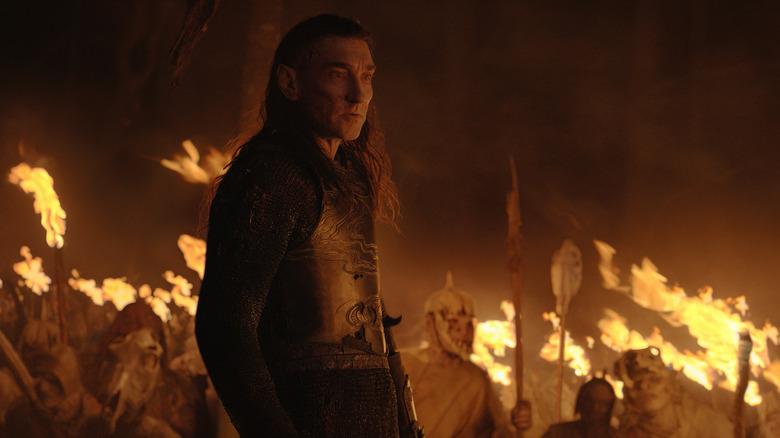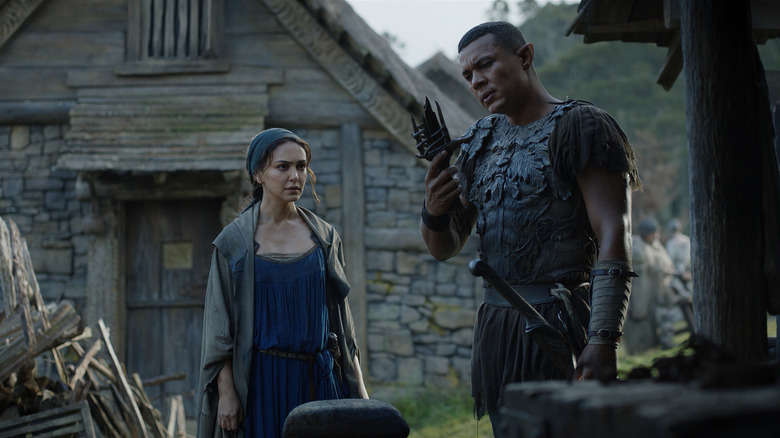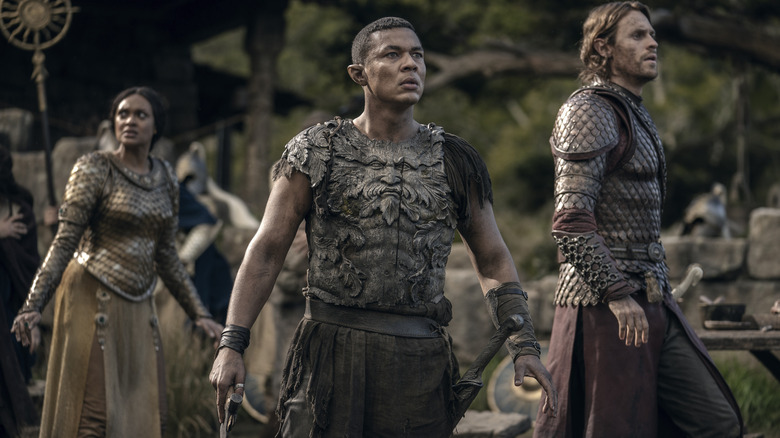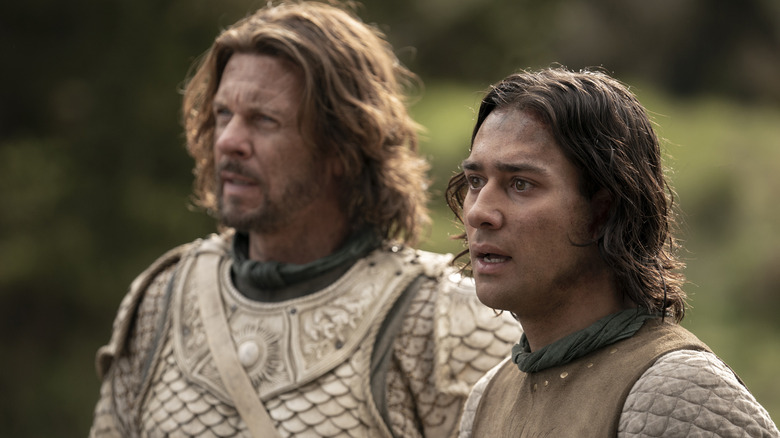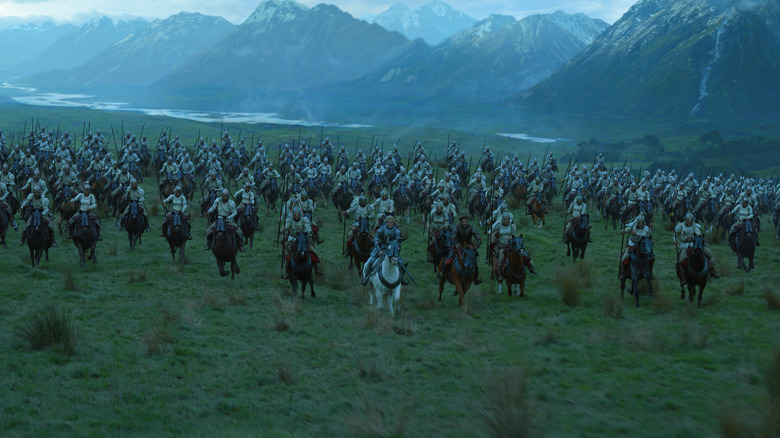Worlds Collide And War Finally Arrives In The Lord Of The Rings: The Rings Of Power
Despite everything "The Lord of the Rings: The Rings of Power" has going for it — a talented ensemble led by Morfyyd Clark's fearsome (but refreshingly flawed!) Galadriel, an exorbitant budget that puts actual blockbuster movies to shame, and license to play around in one of the most fully fleshed-out fantasy worlds ever created — one major aspect has held the new series back somewhat from greatness. As opposed to "The Fellowship of the Ring," which began by focusing on a small group of heroes in one location before steadily spiraling outwards, the first season of "The Rings of Power" has been structured to juggle multiple different storylines with dozens of major characters, all scattered across several different (and far-flung) settings.
For nerds like me who are used to acting like walking encyclopedias, this was more or less expected. For those looking for a solid foundation before jumping headfirst into this strange, unfamiliar, and backstory-heavy narrative, well, this approach may have proved rather more alienating. How much longer could "The Rings of Power" go on, following heroes who we've come to know over the last month, but haven't so much as shared a single second of the screen with others?
Showrunners J.D. Payne and Patrick McKay answered that question pretty definitively with episode 6, titled "Udûn." After weeks of deliberately inching each disparate storyline ahead towards an inevitable crossing of paths, "The Rings of Power" finally pulled the trigger with its most action-packed and thrilling episode yet. By the end of the hour, war has finally arrived on Middle-earth, previously sealed-off subplots have come crashing together, and the status quo has been completely — and explosively — upended.
Mysterious motivations
Ever since his highly anticipated introduction, a figure like Adar (Joseph Mawle) has benefited from the built-in mystique surrounding his place in the canon. Is he Sauron in disguise? Or another obscure character pulled from deep within the lore? Or perhaps a brand-new villain altogether? As fun as that speculation may be, however, all pales in comparison to the simple fact of whether or not the character has been engaging to watch. After all, it's terribly easy for a writer's room to tip too far one way or another in balancing between maintaining a sense of mystery versus frustrating viewers by withholding too much and for too long.
Well, this latest episode — written by Nicholas Adams, Justin Doble, and Payne and McKay – picks up the slack in a big way with some of the show's biggest character reveals to this point in the story. Almost as if in response to this very complaint, "Udûn" opens on Adar planting seeds on the eve of the battle set up in last week's episode.
"New life. In defiance of death," he mutters in elvish to nobody in particular, further hinting at his dark origins and disturbing new role as a "father" to the orcs. But any further examination will have to wait. There's a battle to be fought and won, though he at least takes the time to launch into the kind of rallying speech to his minions that could easily be mistaken for the heroic one Arondir and Bronwyn later use to stir up their own people. Touting freedom from enslavement, a new homeland, and the chance to right some serious (perceived) wrongs, Adar spins the upcoming slaughter of the Southlanders as a righteous cause worth sacrificing for.
As far as the villain's plan and motivations go, we only know it somehow involves the orcs' excavations at that labor camp, a scheme to blot out the sun for his burn-prone orcs, and the search for a new home. Yet despite being kept in the dark, "The Rings of Power" puts us right in the headspace of the enemy anyway unlike no other Middle-earth tale we've experienced before.
Feints and fakeouts
Weirdly enough, the early portions of the episode almost make the epic battle feel a little too easy — at first, at least. The opening attack on the Southlands watchtower of Ostirith, which many assumed would span the length of the episode, instead ends almost anticlimactically when Arondir springs his trap and brings down the watchtower on the orcs, Waldreg (Geoff Morrell) and his traitorous Southlanders, and (seemingly) Adar, as well. Retreating to their once-abandoned village for the inevitable second wave of the attack, this approach begins to make sense as the episode carves out an impressive amount of time and space to focus on the calm before the storm, much as Peter Jackson's "The Two Towers" once did with the battle of Helm's Deep.
This deep breath before the plunge allows relatively underserved character dynamics like Theo (Tyroe Muhafidin) and his mother Bronwyn (Nazanin Boniadi) to get some long overdue development (though it almost feels like too little and too late), while stronger pairings such as Arondir and Bronwyn's romance gets renewed focus as they tentatively plan out their lives together ... should they both survive, of course.
Once the battle is joined once more, the coherently staged fight sequences, wonderfully choreographed stunts, and brilliantly lit sets despite taking place at night (thank goodness they learned the "Game of Thrones" lesson) speak to the prowess of director Charlotte Brändström. In fact, it's almost enough to distract from the idea that the Southlanders again seem to repel the invaders with too much ease. But Arondir's not the only one with tricks up his sleeve, as he discovers that the orcs he assumed he was killing are actually the disloyal Southlanders in disguise who followed Waldreg to bend the knee to the enemy. The abject cruelty of forcing them to unknowingly kill their own can only speak to one mind still calling the shots — Adar.
Many meetings
It's less of a surprise and more of a feeling of the other shoe dropping when Adar is revealed to have escaped death and shows up to survey his orcs having captured the Southlanders along with Arondir, a mortally wounded Bronwyn, and Theo. It's quite startling to realize just how dire the circumstances feel for our heroes, even as we know that Galadriel, Halbrand (Charlie Vickers), Queen Míriel (Cynthia Addai-Robinson), and the rest of the Númenorean fleet are sailing for Middle-earth's shores at breakneck speed. When Theo reluctantly hands over the broken hilt that Adar desires so strongly (again, for only the vaguest reasons that we can currently grasp), all seems lost ... until the last-minute arrival of the Númenoreans plays almost as triumphantly as any number of stirring moments in "The Lord of the Rings" trilogy.
Finally, these physically separated storylines in "The Rings of Power" come together in one fell swoop and help make the series that much more interconnected. When Arondir sees Galadriel in action and acknowledges her name in awestruck tones, their crossing of paths feels just as satisfying (if not more so) than any number of corporately mandated crossover events in blockbuster movies these days. Perhaps best of all, the episode turns the visceral chase sequence between a fleeing Adar and Galadriel and Halbrand in pursuit into another great character moment, leading to the latter two saving each other from coldblooded murder over their own newly-revealed grievances and history with Adar.
Before our heroes can savor their hard-fought victory, however, things take a truly dark turn when Galadriel threatens the captured elf with the eradication of his "children," the orcs, in terms that the script positions as genocide. The reveal that Adar is, in fact, a fallen elf under the sway of Morgoth ("Sons of the dark," as Galadriel puts it) who fell out with Sauron (and claims to have killed him!) over his callous treatment of orcs will undoubtedly become the main takeaway from this scene. But between Galadriel's continued flirtation with allowing her anger and rage to consume her and Halbrand's suddenly fascinating history with Adar, these two characters remain one of the show's most compelling ongoing arcs.
Not so fast...
Viewers would've been forgiven for assuming that the episode would end on a typically upbeat note after the events of this hour. For the most part, the structure of the script follows any number of traditional storytelling beats. With more than two-thirds of the season over, it would've made sense that the big bad of these early episodes was dispatched with, the main threat neutralized, Halbrand installed as the king of the Southlands to unanimous cheers, Theo overcame the powerful temptations of that recovered hilt to throw it away, and our heroes lived happily ever after.
But in one final and clever twist, viewers are given the rude awakening that Adar and Waldreg enacted one final scheme just when it seemed like defeat was inevitable. Giving himself up to capture, Adar sent Waldreg away with the actual hilt to set in motion the chain of events that diverts the local lake into a nearby volcano, tying together the (presumably) unconnected storylines of the hilt, the orc-run dig site, and Adar's obsessive quest to find his orcs a new home by blotting out the sun. A volcanic eruption will definitely serve those purposes, providing an apocalyptic ending to the show's strongest hour yet.
"Udûn," as it turns out, is Sindarin (an elven dialect) for "hell." As our protagonists scramble for cover (along with one brief shot confirming that Adar has somehow escaped) and Galadriel is swallowed up in the hellish carnage, it's genuinely exciting to recognize that we have no real idea where things are headed next or what may happen in these final stretch of episodes. After taking things slow to this point, "The Rings of Power" has suddenly kicked into high gear and doesn't seem likely to ease up anytime soon.
Riddles in the dark and other stray thoughts
- Master and Commander: An early scene set on a Númenorean warship represents one of the strengths that "The Rings of Power" does so well. Even amid all the high fantasy and epic storylines, the episode finds time to throw the elf commander Galadriel and the no-name sailor Isildur together to reveal some much-needed insights into the latter's family life (his mother, as Elendil soon confirms, drowned at some point in the past and left him to take care of his children as best as he could) and his motivations behind leaving Númenor (which he claims isn't the "real" one, having compromised its values since days of old). I still need more reasons to truly care about Isildur beyond what we know he'll eventually do as a grown man, but this and his reconciling with his father Elendil in this episode goes a long way.
- Borrowing from the Best: This one's for the nerds. Beyond the relatively obvious Helm's Deep inspirations or Minas Tirith parallels when Rohan shows up, this episode can't help but bring to mind one other neat parallel to Jackson's "The Lord of the Rings" movies. When Galadriel is chasing down Adar on horseback and especially when she whispers some elvish words of urgency in her horse's ear, did anyone else think of Arwen doing the same thing while escaping from Ringwraiths with Frodo in "The Fellowship of the Ring"? Galadriel, of course, is Arwen's grandmother, lending a neat sense of kinship between these two eerily similar sequences.
- Odds and Ends of Orcs and Elves: When Galadriel interrogates Adar over his origins as a corrupted elf who was taken and tortured by Morgoth, this lines up with one of J.R.R. Tolkien's many explanations of where orcs came from. In this case, this lines up with the idea that they were made to "mock" the elves, much like how cave trolls are meant to be in mockery of ents. The author could never actually settle on one simple origin, ranging from the idea that Morgoth "brooded" them to having been tortured and enslaved elves (which is the show's interpretation of events, it seems) to the wild idea that they were made from sorcery and slime.
- Sauron the Healer? Adar also spins an interesting web about Sauron's true purpose, which is "healing" Middle-earth after the defeat of Morgoth by crafting some power over "the unseen world." It's probable (if not likely) that we won't actually see Sauron until the finale, but keep an eye on how much bricklaying the remaining episodes do to establish his threat and his actual motivations. If nothing else, Adar's (perhaps one-sided?) rivalry with Sauron adds a wholly unique layer to the show and certainly explains his derisive reaction to when Waldreg mistook him for Sauron last week.
